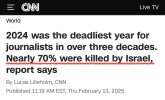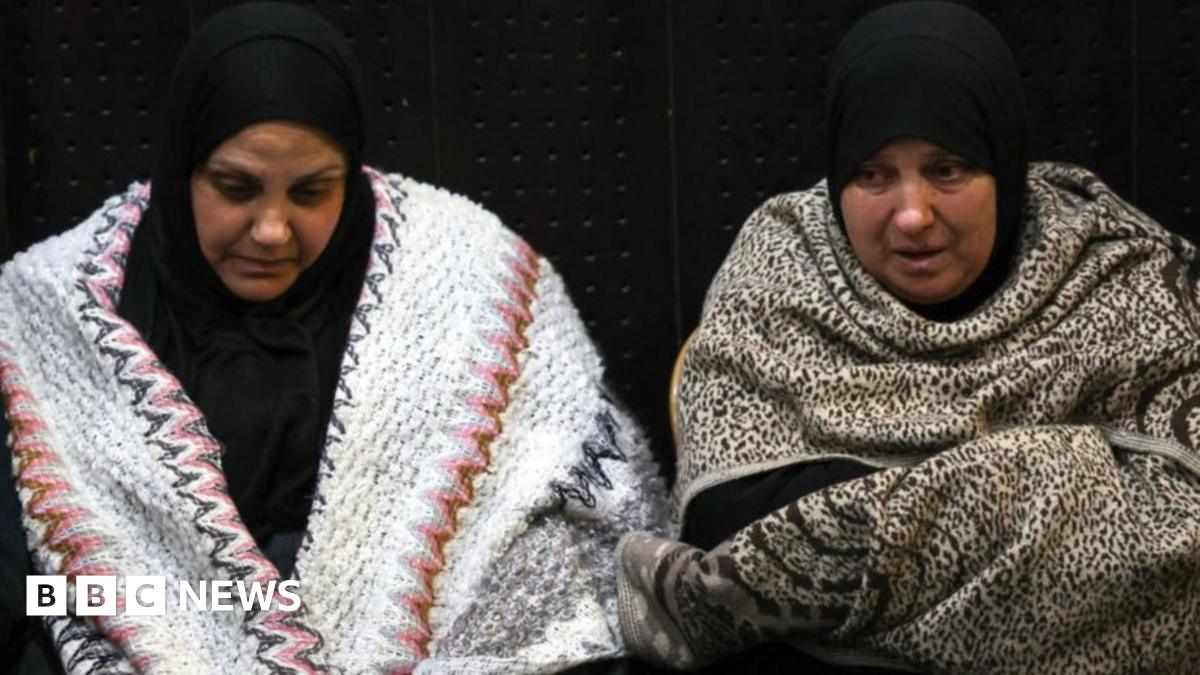Good article showing the difficulties in solving this war.
Six days in the Middle East showed me a two-state solution is a lost cause
Speaking to politicians, intellectuals and ordinary citizens, Matthew Syed wonders whether Israel faces an existential threat from zealots within
Matthew Syed
Saturday February 22 2025, 6.15pm, The Sunday Times
Religion
Israel
Hamas
Gaza
Israel-Hamas war
Matthew Syed at the Memorial site of the Nova music festival massacre near Kibbutz Reim in Israel
KOBI WOLF FOR THE SUNDAY TIMES
Share
Save
How to distil an electrifying six days in Israel and the West Bank? How to encompass the contrasts, the complexity, the labyrinthine politics, every bit as variegated as Jerusalem’s old city with its rabbit warren of cobbled streets on multiple layers, its various “quarters” and sacred buildings jointly administered by Armenians, Catholics, Muslims and, in the case of the Church of the Holy Sepulchre, Ethiopian monks (who apparently control the roof)?
I spoke to dozens of Arab Muslims, Palestinian Christians, Israeli secularists and Orthodox Jews, learning more with each encounter about these lands and their conflicts. I spoke to Israeli politicians — Ehud Barak, Ehud Olmert and Naftali Bennett, the former prime ministers, Yair Golan, the opposition leader, and President Herzog — and was hugely grateful for their time. I met Palestinian intellectuals, too, and Muslim scholars, and travelled to the north and south, east and west, as well as to the marvellous university campus near Tel Aviv. I’ll return to many of these encounters in future columns, but I hope you’ll forgive me for using this essay for a more personal reflection.
The view of Gaza from Netiv HaAsara in southern Israel
KOBI WOLF FOR THE SUNDAY TIMES
I’ll start with the West Bank, for this helped to frame the intractability of the Israel-Palestine “problem” like nowhere else. It is a region reached through a vast infrastructure of security checkpoints, and dotted by Jewish settlements (which I regard as indefensible). I was struck, like so many travellers, by the hospitality of the Palestinian Arabs. The coffee is infused with cardamom and the fragrant tea (if you’re lucky) is unlike anything you will have tasted. In one coffee bar, we were serenaded by the owner while sipping on low stools, chatting amiably to passers-by.
But things became darker when the conversation turned to politics (I didn’t mention my profession as a journalist, and flashed my driving licence to gain their trust: Syed is a holy name in Islamic tradition). When I asked Saif — thirtyish, wide smile — his view of a two-state solution, he waved his hand. “I want a one-state solution. We have to destroy Israel and get rid of the Jews,” he said. At one of the checkpoints, I spoke to Abdullah, who was equally unequivocal. “Within five years, Israel will be gone and the Jews destroyed. It is Allah’s will. Nothing can prevent it.”
You may wonder how intricate courtesy can coexist with genocidal ideology, but I was familiar with this synthesis from parts of my extended family in Pakistan, albeit from a Shia rather than Sunni vantage point. Of the 15 or so people I spoke to in the West Bank, 13 rejected a two-state solution and 12 were supporters of
Hamas (not a rigorous poll, but suggestive). A majority also held the Palestinian Authority in contempt, not least for its corruption. When I pointed out the baroque venality of the leaders of Hamas — living in hotel suites in Doha, their wives carrying designer handbags — one man shrugged. “At least they are committed to the eradication of Israel,” he said.
Palestinians near the West Bank city of Jenin
REX
On the main drag in old Bethlehem, a couple of hundred yards from the church reputedly built on the birthplace of Christ, we stopped for falafel. These are nothing like the falafel one might find on sale in a British supermarket. They are little miracles in ball-shaped form: crispy on the outside, fluffy as marshmallow on the inside. As I walked and ate, I was met by extravagant greetings from some of the men: a kiss of their right hand before shaking mine. Again, I warmed to these people and wondered anew at the terrible grip exerted by a medieval, hateful religious ideology.
After about a minute or two, I came across a toy shop through whose door I could glimpse the soft toys beloved of my daughter. Yet the frontage — featuring what I inferred to be the most popular goodies — was adorned not with puppies and teddies but plastic replicas of AK-47s, machetes and hand grenades. I looked on in horrified fascination as a child, perhaps six or seven, pulled at his mother’s robe. A short negotiation followed before she gave in to his demands, buying one of the machine guns, doubtless perceiving it as an expression of maternal love. This was perhaps the most chilling image of the trip, since it spoke to the underlying dynamics of this “forever war”. The child’s face lit up as they walked away.
The Church of the Nativity in Bethlehem — believed to be built on the site of the birthplace of Christ — and, below, worshippers at the Western Wall
ISSAM RIMAWI/ANADOLU VIA GETTY IMAGES
MATTEO PLACUCCI VIA GETTY IMAGES
The longer I stayed on the West Bank, the more I shook my head at the shallow pieties of western politicians who trot out “two-state solution” and “Palestinian aspirations” like automatons. Do they do it to appeal to domestic audiences or do they actually believe that some abstract notion of even-handedness is the route to peace? Do they not see that the provision of any additional funds, land or aid will lead to the escalation of bloody jihad, as so often in the past? Do they not grasp that this is why the fanatical leaders have consistently rejected the deals offered to them, not least because their funders in Iran have no interest in peace, but only in using their proxies as pawns in the long-term objective of erasing Israel from the map?
Saul Bellow wrote about the “universal eligibility to be noble”, reflecting through the words of Augie March the common human impulse to civilised life. But alongside this, we must acknowledge what Richard Dawkins calls the “virus of fundamentalism”, a phrase that came to me while watching masked murderers posing with the coffins of Israeli children in that grotesque charade of a hostage release on Thursday (we later learned that the corpse in the fourth coffin was not
Shiri Bibas but an “anonymous woman”), surrounded by Gazan children and cheering crowds.
The handover of the Bibas children’s coffins and the remains of Oded Lifshitz, 88, on Thursday
EYAD BABA/AFP/GETTY IMAGES
Again, I couldn’t help noting the all-pervading influence of the ayatollahs of Iran, perhaps the most grotesque embodiment of Umberto Eco’s line in
The Prague Cemetery: “People are never so completely and enthusiastically evil as when they act out of religious conviction.” It is this regime that funds the propaganda machine, the indoctrination of children who sing about killing Jews and whose interests are served by the perpetuation of war. This is well understood by moderate Arabic opinion, hence the Abraham Accords. They regard Hamas, Hezbollah and the Houthis with contempt, seeing these Iranian tentacles as obstacles to peace and prosperity.
But this is why I suggest that the prosecution of the
war in Gaza has been a mistake, a massacre that no friend of Israel should airbrush. I could never see how this would lead to security for Jews, given that the head of the snake is more than a thousand miles from Gaza City. Agree or disagree with this analysis, I hope you’ll acknowledge the sentiments of a wise Arab man I spoke to at my hotel in Jerusalem. Peace in the Middle East is impossible while the regime in Iran — hated by its own people and committed to the destruction of the entire western world — endures.
Israeli protesters call on their government to ensure all hostages are released
KOBI WOLF FOR THE SUNDAY TIMES
How to capture my time in
Israel: the bustling cosmopolitanism of Tel Aviv, the quiet contemplation of standing on the site of the Nova music festival massacre (now a moving memorial to its victims), the kibbutzim dotted around the nation and, of course, the intense majesty of Jerusalem. I left with renewed admiration for this nation, one of the miracles of the post-enlightenment world, a place that has survived so many wars and which has not merely endured but excelled: with multiple Nobel prize winners, a thriving tech sector, and welcoming, marvellously garrulous people.
But here, again, I couldn’t help noticing the strange grip of religious fanaticism, albeit in different guise. I could write endlessly of the racist thuggery of the finance minister Bezalel Smotrich and the ex-security minister Itamar Ben-Gvir, the former still embedded in the Israeli cabinet, the latter who left in protest at the
recent peace deal. It is striking how many secular Israelis lament the rightward turn of recent governments, led by that cynical survivor, Binyamin Netanyahu, and fear that the commitment to liberal democracy is dying.
Tel Aviv remains bustling and cosmopolitan
PHILIPPE MAGONI/SIPA/REX/SHUTTERSTOCK
JACK GUEZ / AFP
Yet it was the ultra-Orthodox Haredim that fascinated me the most. I tried, with the help of a translator, to engage with these bearded men, walking through the cobbled streets of the old city, or approaching the western wall beneath the Temple Mount, but was serially rebuffed. They didn’t want to talk, seemingly lost in their own worlds. One paused briefly when I asked for directions, then moved on.
I spoke to Reem Aminoach, a former brigadier general in the Israel Defence Forces, whose early life was spent in ultra-Orthodox circles before renouncing the sect. He explained that at the founding of Israel in 1948, David Ben-Gurion carved out special privileges for the group, regarding them as custodians of Jewish culture. Perhaps this wouldn’t have mattered if they had remained a small clique estimated at 2 per cent of the population. But birth rates of above six per woman have caused this proportion to soar — now 13.6 per cent and still rising.
The Haredim indoctrinate their youngsters in segregated schools, where maths and English are not taught, most refuse to perform the military service required of everyone else, spend much of their day studying the Torah (males) and receive generous subsidies while paying precious little in taxation. Politicians have talked tough about ending these privileges, but have never followed through (it reminds me a little of how western politicians have failed to deal with mass immigration), not least because the ultra-Orthodox political parties have cemented successive coalitions.
Syed speaks to students in Tel Aviv
KOBI WOLF FOR THE SUNDAY TIMES
“I risked my life in Gaza while these guys sit on their arses,” Omer said at a coffee shop in Tel Aviv. “I am sick and tired of these people jetting off on holidays while the rest of us are defending the nation,” Ariel, who worked in IT, said. A group of students in Jerusalem shook their heads and said that they plan to leave Israel for good when they get the chance — an alarming sentiment that I encountered often over the past week. Indeed, it was rare to meet anyone willing to defend the Haredim, except (of course) politicians eager for their block vote.
Perhaps it takes an outsider to see just how poisonous these resentments have become, and how antithetical to the philosophy of a nation built on the solidarity of people whose ancestors are drawn from across the world. It is why I travelled to Ben Gurion airport contemplating a strange irony, two thousand years after the time of Christ and a millennium and a half since Muhammad. While Israel has (understandably) focused on the fanatics abroad, it now also faces an existential threat from the zealots within.














